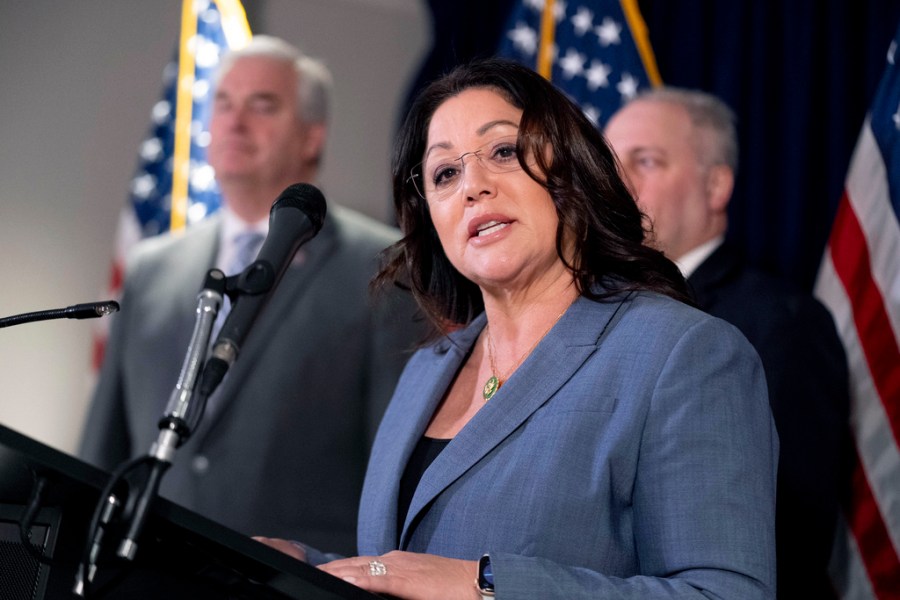
Given the Republican Party’s track record on worker and union issues, and President-elect Donald Trump’s anti-union first term, it is reasonable to reject the narrative that his party’s approach to labor policy is changing as part of a rebrand as the party of working people.
Trump’s transition decisions suggest that his second term won’t differ much from his first. Key positions will be held by appointees with long records of standing up for billionaires and corporations — he has already tapped 14 billionaires for administration roles.
But the nomination of former Rep. Lori Chavez-DeRemer (R-Ore.) as Labor secretary is undoubtedly an outlier. The Teamsters Union pushed for her nomination, she was endorsed by unions as a candidate for Congress, and she supported the Protect the Right to Organize Act.
It should not be easily dismissed that Trump has nominated someone who supported the PRO Act. It may just be misdirection, but it may also suggest something different: a pivot by the Republican Party that, motivated by a plan to peel union support away from Democrats, involves a change in labor policy.
Of course, Trump has yet to make numerous other nominations critical to the labor movement. He must fill vacancies on the National Labor Relations Board’s, where he previously appointed anti-union leadership, and decide whether to fire the current general counsel, who has been a great champion for labor rights. The key architect of an emerging legal strategy to destroy the NLRB, Elon Musk, seems to exercise undue influence over Trump, who has been notably silent on Musk’s constitutional challenges to the National Labor Relations Act.
He also intends to nominate Russell Vought to lead the Office of Management and Budget. Vought has vowed to put federal employees “in trauma.” Twenty-eight percent of those federal employees are union members.
While we remain vigilant about these other nominations, we should also consider the possibility that Chavez-DeRemer’s appointment, though certainly a political attempt to drive a wedge between unions and Democrats, may also portend a Republican effort to pass labor law reform — something that Republicans in the Senate have blocked Democrats from achieving across three Democratic administrations. The possibility that Republicans could win the support of more of the U.S. labor movement by successfully reforming labor laws for the first time in nearly 70 years poses a significant, long-term threat to the Democratic Party.
It is highly doubtful a Republican Congress would pass the PRO Act as currently drafted. There’s too much in the bill that’s anathema to the business lobby. But it is possible Republicans could put forward a trimmed-down alternative that makes it easier for workers to organize a union and for unions to bargain collective agreements.
Steeper penalties for employers that interfere in organizing campaigns? A right for workers to sue bosses that violate labor rights? A Republican-controlled Senate committed to winning over the union movement might well be supportive. Indeed, Sen. Josh Hawley (R-Mo.) has reportedly circulated a “Framework” for labor law reform that includes some of these ideas.
Understanding the Chavez-DeRemer pick requires putting it in the context of a shift within a highly influential segment of the Republican Party. The shift consists of ultra-conservative Republican senators voicing the idea — long an article of faith among progressives — that unions correct for the worst excesses of free markets and offer everyday Americans an actual shot at building middle class lives.
How should Democrats, and those who have fought for decades to achieve meaningful labor law reform, respond?
First, we should recognize that Republicans do not support the labor movement for the same reasons as progressives, including many union members. Their two visions are radically distinct. Both sides like unions’ ability to raise wages and improve benefits for working people. But for progressives, unions represent the best chance to build a more equitable economy and politics.
Throughout U.S. history, unions have helped redistribute wealth and political power from the corporate class to the working class. Those committed to economic and political equality have understood that strong unions are key to achieving a more equal America.
The Republican contingent supports unions for very different reasons. For example, anti-regulatory conservatives also like the fact that, by setting terms and conditions of employment through collective bargaining, unions can make government oversight of the employment relationship less necessary.
And then there’s the deeper divide between the Republican vision for the working class and the progressive one. The Republican Party adopted a restrictionist approach to immigration — arguing that the only way to ensure American workers have sufficient bargaining power is by tightening labor markets through the exclusion of immigrant workers. This is a demonstrably false, straw-man argument. Rather than excluding workers based on immigration status, progressives understand that by organizing immigrants into unions alongside non-immigrant workers, we can ensure that all workers have the bargaining power needed to win livable wages.
To put it simply, the Republican vision for American labor policy is based on exclusion; the progressive vision is based on inclusion.
These differences will matter a lot when it comes time for Republicans to propose policy changes, because labor reforms designed to build a more equal society must be much more comprehensive than labor reforms designed to justify deregulation. And labor policy that aims to ensure unions can build power by organizing everyone are very different from labor policy built around the idea that we must exclude some for the benefit of others.
If the Democratic Party can articulate the difference between these two visions, and come to stand for the progressive one, it can hope to earn the continued support of the labor movement. If Democrats fail to do so, they may find themselves surrendering the field to a Republican Party willing to embrace pro-union labor policy to win elections.
Sharon Block is Professor of Practice and executive director of the Center for Labor and a Just Economy at Harvard Law School. Benjamin Sachs is Kestnbaum Professor of Labor and Industry at Harvard Law School.












